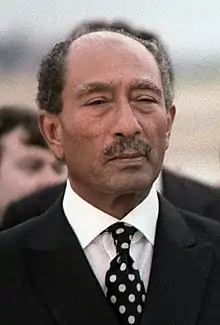

.svg.png.webp) |
|---|
|
|
| Constitution (history) |
| Political parties (former) |
|
|
The office of President of Egypt was established in 1953. The president is the head of state of Egypt and the Supreme Commander of the Egyptian Armed Forces. The current president is Abdel Fattah el-Sisi, who has effectively controlled the country since the 2013 coup d'état, and was officially elected president in 2014.
Background
The first president of Egypt was Mohamed Naguib, one of the leaders of the Free Officers Movement who led the Egyptian Revolution of 1952, and who took office on 18 June 1953, the day on which Egypt was declared a republic. Since then the office has been held by five further people: Gamal Abdel Nasser, Anwar Sadat, Hosni Mubarak, Mohamed Morsi and Abdel Fattah el-Sisi. In addition, Sufi Abu Taleb acted as president between Sadat's assassination and the Mubarak's election as his successor, and Adly Mansour acted as president after Morsi's overthrow in the 2013 coup d'état.
Following Hosni Mubarak's resignation on 11 February 2011[1] in the Egyptian Revolution of 2011, the office was vacant, with the functions of head of state and head of government being discharged by the chairman of the Supreme Council of the Armed Forces, Field Marshal Muhammad Tantawi.[2]
Mohamed Morsi took office on 30 June 2012, after being elected by the presidential election held on 23–24 May and 16–17 June 2012.[3] He was deposed by the Egyptian Armed Forces in a coup d'état on 3 July 2013, following massive protests calling for his resignation.[4] He was succeeded by Adly Mansour, the head of the Supreme Constitutional Court of Egypt, as Acting President. Mansour was sworn into office in front of the Supreme Constitutional Court on 4 July 2013.[5]
Current President el-Sisi took office on 8 June 2014, after being elected by the presidential election held on 26–28 May 2014.[6] He was subsequently re-elected twice (by the presidential election held on 26–28 March 2018[7] and by the presidential election held on 10–12 December 2023[8]).
List of officeholders
| No. | Portrait | Name (Birth–Death) |
Elected | Term of office | Political party | ||
|---|---|---|---|---|---|---|---|
| Took office | Left office | Time in office | |||||
(18 June 1953 – 22 February 1958) | |||||||
| 1 |  |
Mohamed Naguib محمد نجيب (1901–1984) |
— | 18 June 1953 | 14 November 1954 (resigned) |
1 year, 149 days | Military / Liberation Rally |
| — |  |
Revolutionary Command Council مجلس قيادة الثورة Chairman: Colonel Gamal Abdel Nasser جمال عبد الناصر (1918–1970) |
— | 14 November 1954 | 23 June 1956 | 1 year, 222 days | Military |
| 2 |  |
Gamal Abdel Nasser جمال عبد الناصر (1918–1970) |
1956 | 23 June 1956 | 22 February 1958 | 1 year, 244 days | Liberation Rally (until 1957) |
| — | National Union | ||||||
(22 February 1958 – 2 September 1971) | |||||||
| 2 |  |
Gamal Abdel Nasser جمال عبد الناصر (1918–1970) |
1958 1965 |
22 February 1958 | 28 September 1970 (died) |
12 years, 218 days | National Union (until 1962) |
| Arab Socialist Union | |||||||
| 3 |  |
Anwar Sadat أنور السادات (1918–1981) |
— | 28 September 1970 | 15 October 1970 | 17 days | Arab Socialist Union |
| 1970 | 15 October 1970 | 2 September 1971 | 322 days | ||||
(2 September 1971 – present) | |||||||
| 3 |  |
Anwar Sadat أنور السادات (1918–1981) |
1976 | 2 September 1971 | 6 October 1981 (assassinated) |
11 years, 8 days | Arab Socialist Union (until 1978) |
| National Democratic Party | |||||||
| — |  |
Sufi Abu Taleb صوفى أبو طالب (1925–2008) Acting |
— | 6 October 1981 | 14 October 1981 | 8 days | National Democratic Party |
| 4 |  |
Hosni Mubarak حسنى مبارك (1928–2020) |
1981 1987 1993 1999 2005 |
14 October 1981 | 11 February 2011 (resigned) |
29 years, 120 days | National Democratic Party |
| — |  |
Supreme Council of the Armed Forces المجلس الأعلى للقوات المسلحة Chairman: Field Marshal Muhammad Tantawi محمد طنطاوي (1935–2021) |
— | 11 February 2011 | 30 June 2012 | 1 year, 140 days | Military |
| 5 |  |
Mohamed Morsi محمد مرسي (1951–2019) |
2012 | 30 June 2012 | 3 July 2013 (deposed) |
1 year, 3 days | Freedom and Justice Party |
| — |  |
Adly Mansour عدلي منصور (born 1945) Interim |
— | 4 July 2013 | 8 June 2014 | 339 days | Independent |
| 6 | .jpg.webp) |
Abdel Fattah el-Sisi عبد الفتاح السيسى (born 1954) |
2014 2018 2023 |
8 June 2014 | Incumbent | 9 years, 222 days | Independent |
Timeline

See also
Notes
References
Citations
- ↑ McGreal, Chris; Shenker, Jack (11 February 2011). "Hosni Mubarak resigns – and Egypt celebrates a new dawn". The Guardian. ISSN 0261-3077. Retrieved 26 February 2020.
- ↑ Egypt Trades Torture Supervisor for 'Mubarak's Poodle'? ABC News, 11 February 2011
- ↑ "Muslim Brotherhood candidate Morsi wins Egyptian presidential election". Fox News.com. Retrieved 24 June 2012.
- ↑ Coup topples Egypt's Morsy; supporters reportedly rounded up - CNN.com. Edition.cnn.com. Retrieved on 14 August 2013.
- ↑ "Adly Mansour Sworn in As Egypt's Interim President". HuffPost. Associated Press. 4 July 2013. Retrieved 4 July 2013.
- ↑ "El-Sisi wins Egypt's presidential race with 96.91%". English.Ahram.org. Ahram Online. Retrieved 3 June 2014.
- ↑ "Abdel-Fattah al-Sisi wins a second term in Egypt". The Economist. 30 March 2018.
- ↑ "El-Sissi wins Egypt's presidential election with 89.6% of the vote and secures third term in office". CTV News. 18 December 2023. Retrieved 18 December 2023.
Sources
- El-Gawady, Mohamed (1986). Cabinets during period of Revolution.
- Hafez, Salah (2001). Democracy Shock.